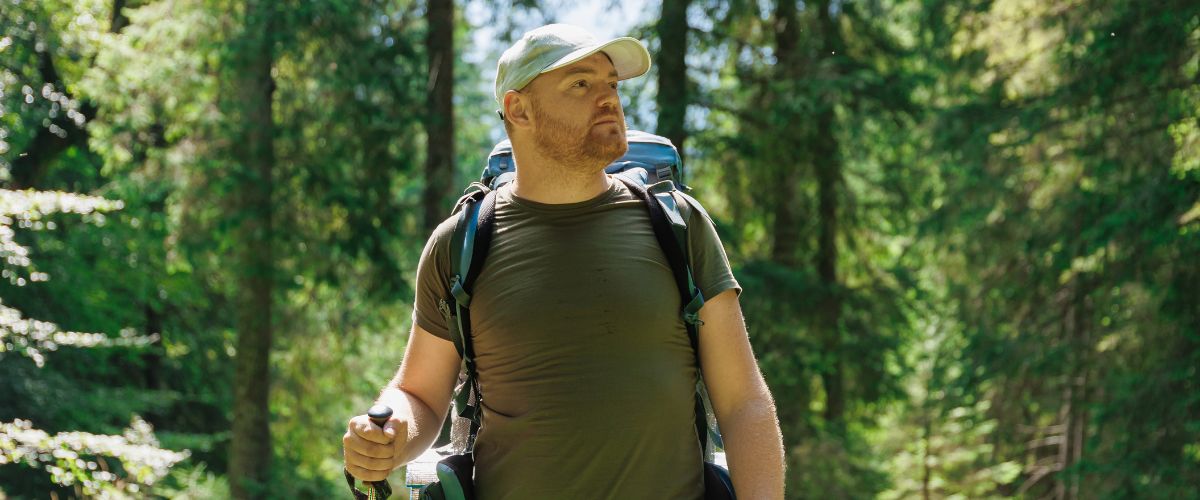Jonny Wilkinson talks joy and his mental health journey
Regarded as one of the best rugby players of all time. Here, Jonny Wilkinson talks candidly about how his professional career impacted his mental health

We caught up with Vitality Ambassador, Jonny Wilkinson, to find out about how he manages his mental health, manages work stress, the three mental health self-care tips.
Plus, how physical health and movement and nutrition can support a healthier and happier mind.
What would you say is something that brings you joy everyday?
J: First of all, it’s really important to get a handle on joy.
If the question were ‘what makes you smile?’, that's a physical and tangible thing.
Joy is really more difficult. What makes me smile every day is laughing, playfulness, spontaneity and creativity. You could argue those bring a lot of joy too.
What brings me joy is being alive. Having that opportunity to engage in life is more than enough.
How do I like to spend my days - with spontaneity and creativity? Spontaneity, creativity, joy and love are all about giving in and surrendering to the not knowing.
How would you encourage others to open up and talk about mental health?
J: That’s a really difficult question because letting go and speaking out is a subjective decision depending on what feels right.
I would never encourage anyone to do anything that doesn’t suit them.
For me though, speaking out is part of the path towards everything that I want. When you feel like you’re overcome from the outside, it’s an opportunity to realise what you need to let go of in order to grow and face those challenges.
If you stop being overwhelmed and challenged, there would be no growth. Getting interested in the challenge - putting yourself on the line and not being afraid to say ‘this is what I want’ and going after that.
What advice would you give to men to talk about their mental health and access support?
J: For me, one of the most liberating things was coming to the realisation that everyone has something going on.
No matter what you see or hear about people’s stories where they seem to have ‘nailed it’ all, the truth is that someone always has something going on, and that’s okay because it’s everyone’s individual journeys.
There is no comparative nature to it – in terms of ‘someone is doing better than me’, it’s just the universe showing you that this is how unique you are.
I have no idea what it’s like to be anyone else, and that’s the way I want to keep it. I’m sticking to my lane and journey, and if it helps someone else with theirs, that’s great. I’d love to hear what other people have in their lane, but I’m definitely not adventuring over that line.
What is one of the biggest challenges you had to overcome?
J: During my professional career, there were always two threads to everything.
One thread, an inner voice of passion, excitement and calling towards being engaged in life.
The other thread, a conditioned internal voice that comes from being untrusting of myself. Listening to that second thread resulted in a feeling of being disconnected from my sense of self-worth. That lack of self-worth was there during my rugby career.
I love rugby and playing rugby, but I needed to discover what I am capable of and all the things that would be possible.
For me, it was about finding my value and achieving my place, but also finding a feeling of deserving and belonging.
Has imposter syndrome played a part in those challenges?
J: I think imposter syndrome is exactly what life is all about. I don’t mean that it is the only answer, but it is what pushes everything forward. It is about shifting from ‘I’m not worthy’ to ‘I am worthy’.
It is not just a thought, it’s a deeper realisation and journey that never ends.
What are a few of your self-care non-negotiables you practice?
J: The first would be awareness.
You can only experience what you can in life, and in order to become more aware you open up the boundaries to what experience is for you.
You could have a dragon breathing down your neck, but if you’re not aware of it, then you are not experiencing it. Life is full of amazing things we never realise, but if we’re aware then we can expand our experience.
Once you’re aware of something, you can do something with that which could be to accept it.
The next one is acceptance.
The idea is that acceptable is non self-serving behaviour, which is why it links you up to something bigger, where the real possibility lies.
So, accepting and letting go is the necessity, rather than thinking ‘what can I gather and gain from this experience’, reframe your thoughts to think ‘what do I need to let go of and accept from this challenge’.
The final one is responsibility.
The ability to respond. This comes with acceptance and awareness. With awareness, it’s about listening to your inner voice and what that is calling for – what your true passion and calling in life is.
Once you gather an awareness, you can respond – and if that takes you into a vulnerable space, you have to trust in knowing that this is the journey towards something bigger.
How do you stay active and eat healthy to support your mental health?
J: Moving in a relaxed, flowing manner, bringing notice to where you have tension in the body, or stretching and coming back to the range of motion that reminds you of your reach and influence.
If you sit at a desk all day, you’re sat in your survival mode and forget that you are free, so incorporate movement and remind your body, your mind, that you’re free to move.
You can also use movement to offload erratic energy, and you might find at the end of doing some exercise, that you really feel ready to just sit with your thoughts. Even in yoga practice, some of the moves are about preparing the system and being able to sit and think.
Take time after exercise to sit and thank, and make the most of that access we have to ourselves.
From a nutritional perspective, the body is rebuilding itself and regenerating itself over and over again, and it’s only doing that through the food we eat.
So, if we’re building our bodies from the food we eat, you can understand that if we start to eat heavily processed, less natural and even less local food, we don’t know what that’s doing to the body.
Experiment and find out what feels good for you.
What inspires you?
J: In terms of being inspired, everyone and everything has that opportunity. I feel like everything I am involved in is there for a reason.
When you explore that further, you’ll see that there is inspiration everywhere. It’s so easy to miss that when you already have an idea of someone or something before you meet them.
It doesn’t matter who you’re speaking to, whether boy, girl, young, old, employed or not, none of this has anything to do with the individual and the opportunity to explore the possibilities of where that interaction is destined to go.
Do you have any tips to help improve our mental health?
J: To become familiar with that matters to you right now: whether that’s fear or regret or bitterness or anger. Then just give it a go and do some research on it.
Challenge your own ideas and put yourself in that space.
Follow your highest passion and excitement. If you are listening to someone talk, and only one sentence gets you excited, then take that sentence and follow it wherever it takes you.
Find your highest passion and excitement and just follow it. Remember that it’s your calling – try it and give it a go.
This, alongside looking after yourself in your diet, movement, breathing, sleep and practising awareness, acceptance and responsibility is part of your quiet time.
Also if you can get that quiet time in your day to go for a slow walk, take it.
Just keep coming back to that quiet time, without the aim that it’s somehow going to bring you something.
As a Vitality member, you could get partner benefits and rewards with a range of big brands. Available with qualifying health insurance, life insurance and investment plans. Log in to the Member Zone for the details.
Recent articles

5 ways to make your walk more mindful
Why not make your walk more mindful this Mental Health Awareness Week, and try the ‘silent walking’ trend taking TikTok by storm. Here are five ways to get you started

How physical activity can hack your anxiety
Physical activity can improve many aspects of daily life, but what many don’t realise is how effective it really is. Vitality Magazine finds out for you

Ovarian cancer: How to spot the signs and detect it early
Ovarian cancer is far too often diagnosed late due to its ‘silent’ symptoms. This World Ovarian Cancer Day, we explore ways to prevent ovarian cancer and detect it early
